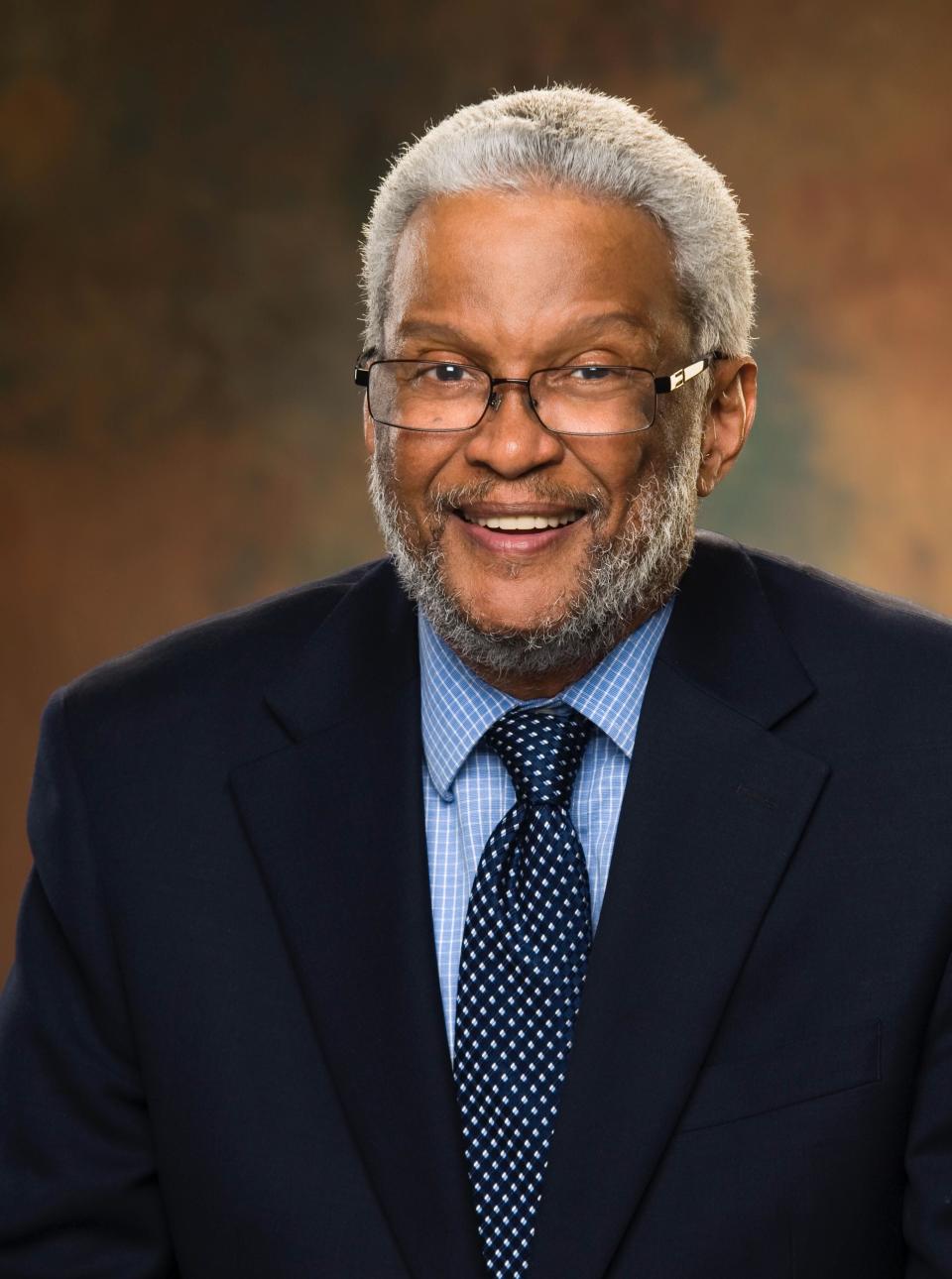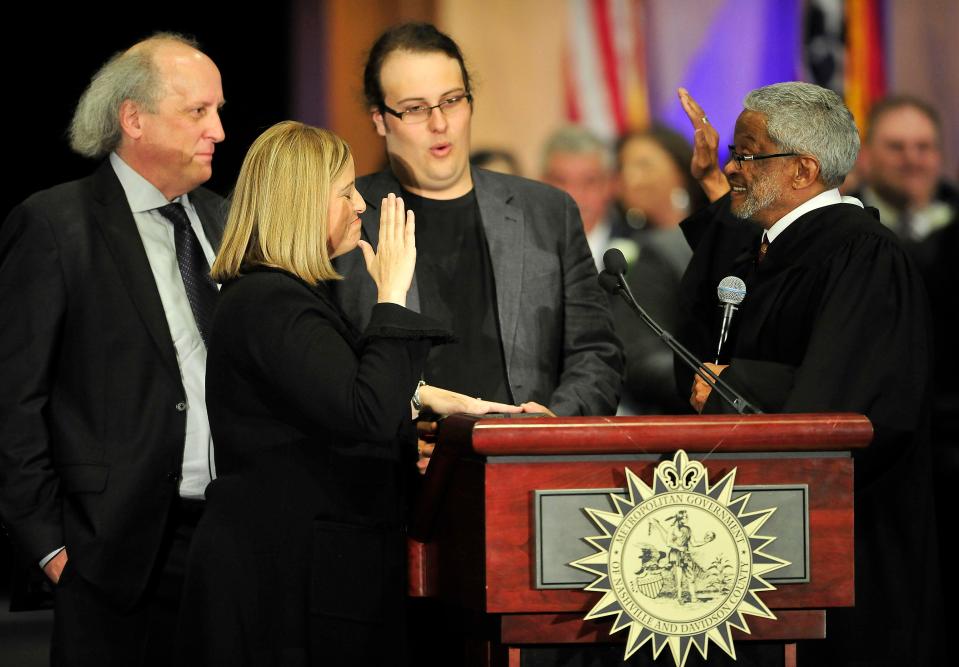Judge Richard Dinkins, who fought for equality in education as a jurist, dies at 71
- Oops!Something went wrong.Please try again later.
Retired Judge Richard H. Dinkins, who helped the lead the fight for desegregation in Nashville as an attorney and remained an advocate for civil rights as a judge, died Sunday. He was 71.
Dinkins was the first Black judge on the Tennessee Court of Appeals. In 2008, then-Gov. Phil Bredesen appointed him to the bench, where he served until retiring in 2022. Prior to that, Dinkins served as a chancellor in the Davidson County Chancery Court from 2003-2008.
For his work advancing civil rights in public education, Dinkins was honored throughout his career. He received the Freedom Fighter Medal from the National Association for Equal Opportunity in Higher Education, the Nelson C. Andrew Distinguished Service Award from the Nashville Public Education Foundation and the William M. Leech Jr. Public Service Award from the Tennessee Bar Association.

Judges, politicians and lawyers from around Tennessee remembered Dinkins' thorough legal scholarship, tireless work for justice and kindness to others.
"Judge Richard Dinkins was a pioneer and a treasured colleague," Tennessee Supreme Court Chief Justice Holly Kirby, who served with Dinkins on the Court of Appeals, said in a statement to the Tennessee Administrative Office of the Courts. "Tennessee is a better place today because of his lifelong work on civil rights, especially in education and employment. Throughout his career, he stood for equality. The Court extends its deepest sympathy to his family and colleagues.”

Nashville Mayor Freddie O'Connell posted a statement to social media Tuesday morning honoring Dinkins.
"Judge Dinkins brought gravity & grace, humility & humor to every moment I had with him," O'Connell said in a post to X that he made accompanying his statement. "He advised me and so many others on matters of rights. I’m glad I knew him. I’m honored to have been someone who received wisdom from him, and I will miss him. My condolences to his family."
Judge Dinkins brought gravity & grace, humility & humor to every moment I had with him. He advised me and so many others on matters of rights.
I’m glad I knew him. I’m honored to have been someone who received wisdom from him, and I will miss him.
My condolences to his family. pic.twitter.com/qv7klP8OXB— Freddie O’Connell (@freddieoconnell) October 3, 2023
Former Mayor Megan Barry, who Dinkins swore in as mayor, said in a statement to the Tennessee Administrative Office of the Courts that Dinkins was a dear friend and the first person to encourage her to run for mayor.
"The passing of Judge Richard Dinkins is a huge loss to the legal community and to all those who knew and loved him. He was so special to us. Godspeed," Barry wrote on X.
The passing of Judge Richard Dinkins is a huge loss to the legal community and to all those who knew and loved him. He was so special to us. Godspeed. Judiciary Mourns the Loss of Former Judge Richard Dinkins | Tennessee Administrative Office of the Courts https://t.co/11XmH8Op0q
— Megan Barry (@MeganCBarry) October 2, 2023

Dinkins was born in Nashville in 1952. His father, the late Rev. Charles L. Dinkins Sr., served as pastor of First Baptist Church in East Nashville and was president of the Nashville branch of the NAACP.
According to the Tennessee Administrative Office of the Courts, Dinkins began his education in Nashville public schools just as school desegregation began, a mission that Dinkins would help Nashville more fully realize as an attorney.
After his family moved in 1960 to Memphis, where his father served as president of Owens College, Dinkins graduated from high school and attended Denison University in Granville, Ohio. He returned to Nashville for law school, graduating from Vanderbilt University Law School in 1977.
Dinkins worked in private practice for more than 20 years with civil rights attorney and Tennessee state Sen. Avon N. Williams Jr., who initially sued the Nashville public school system in 1955. Dinkins later became the lead attorney in that case and other high-profile civil rights and discrimination cases.
While at Dinkins and Williams, he was the cooperating attorney for the NAACP Legal Defense and Educational Fund and the cooperating attorney for the Minority Business Enterprise Legal Defense and Educational Fund.
Ronald McNutt, a former law partner at Dinkins and Williams who worked with Dinkins for more than 10 years, remembered Dinkins as a "devoted and conscientious man with a great sense of humor."
"He made a lot of stressful times relatively pleasant, and we celebrated victories and mourned losses together," McNutt said. "I loved Richard and I am grateful to him and his family for the career and friendship."
Many others who knew and worked with Dinkins offered remembrances to the Administrative Office of the Courts, which you can read on their website.
Dinkins is survived by his children, Lachanta Lampkin, Zuri Walker and Ian Dinkins; grandchildren Lariah Hayes and Kennedy Potter; son-in-law S.L. Lampkin; and brother Ken Dinkins, the Tennessee Administrative Office of the Courts wrote.
Evan Mealins is the justice reporter for The Tennessean. Contact him at emealins@gannett.com or follow him on X, formerly known as Twitter, @EvanMealins
This article originally appeared on Nashville Tennessean: Judge Richard Dinkins, who helped desegregate Nashville schools, dies

